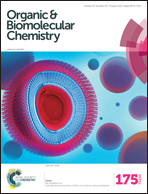The kinetics and mechanism of the organo-iridium catalysed racemisation of amines†
Abstract
The dimeric iodo-iridium complex [IrCp*I2]2 (Cp* = pentamethylcyclopentadiene) is an efficient catalyst for the racemisation of secondary and tertiary amines at ambient and higher temperatures with a low catalyst loading. The racemisation occurs with pseudo-first-order kinetics and the corresponding four rate constants were obtained by monitoring the time dependence of the concentrations of the (R) and (S) enantiomers starting with either pure (R) or (S) and show a first-order dependence on catalyst concentration. Low temperature 1H NMR data is consistent with the formation of a 1 : 1 complex with the amine coordinated to the iridium and with both iodide anions still bound to the metal-ion, but at the higher temperatures used for kinetic studies binding is weak and so no saturation zero-order kinetics are observed. A cross-over experiment with isotopically labelled amines demonstrates the intermediate formation of an imine which can dissociate from the iridium complex. Replacing the iodides in the catalyst by other ligands or having an amide substituent in Cp* results in a much less effective catalysts for the racemisation of amines. The rate constants for a deuterated amine yield a significant primary kinetic isotope effect kH/kD = 3.24 indicating that hydride transfer is involved in the rate-limiting step.


 Please wait while we load your content...
Please wait while we load your content...